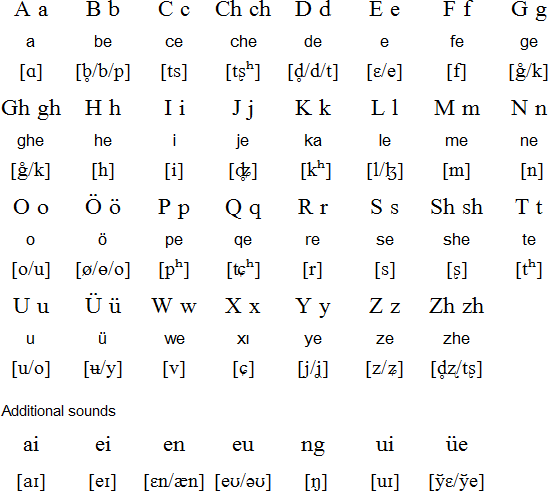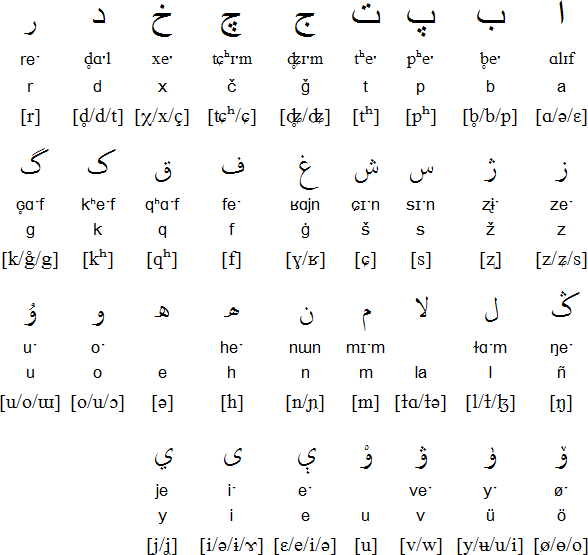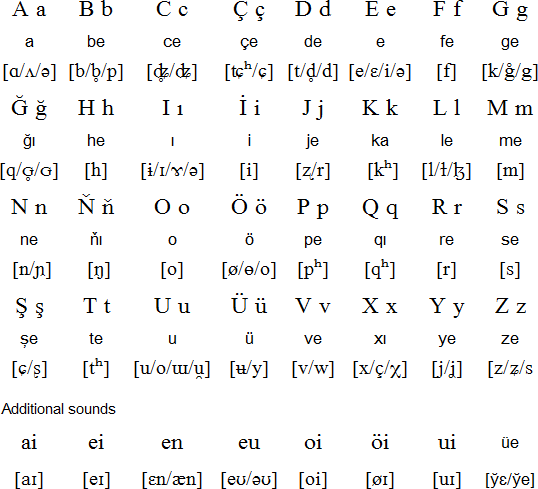Salar is a Turkic language spoken by about 60,000 people in China, mainly in Qinghai and Gansu provinces, and also in Xinjiang. The Salar people arrived in China during the 14th century, and according to Salar legend they came from Samarkand. The Salar language is thought to be related to western Turkic or Oghuz languages and has been heavily influenced by Tibetan and Chinese languages.
The version of the Latin alphabet for Salar is based on Chinese Pinyin and is officially approved by the Chinese authorities.

Most letters have different pronunciations depending on where they appear in a word and/or which letters appear next to them: more information (Word Doc in German)
The Arabic alphabet was traditionally used to write Salar, and is still used and is generally prefer by the Salar.

The names of the letters are in the IPA.
This is a Turkish-based version of the Latin alphabet for Salar which is not popular with Salars.

Information about the Salar alphabets compiled by Wolfram Siegel
Hear how to pronounce Salar:
Ne güzel doğqan yeridiği göl,
Ne uzan gelğen yaşlıx yol,
Tişde men göx asmandan soracı,
Neğe gece yalğuz vardır?
Bir ax quş bulatdan çixci.
Köp beyix şeherler men varmış,
Köp çoñ deryalar mende görmiş,
Bir gün öyüm menden yırax volsa eğer,
Göñlümde başqa yoxdur,
Her vağıt yireğimde yamğur yağır.
From Doğqan yerim (My native land): http://www.salars.cn
Information about Salar | Numbers
Information about the Salar language
http://en.wikipedia.org/wiki/Salar_language
http://tr.wikipedia.org/wiki/Salarca
https://www.ethnologue.com/language/slr
Book of Salar proverbs (in Chinese and Salar)
http://issuu.com/zhengchuyang/docs/salar_iblet_sozler
Altay, Äynu, Azerbaijani, Bashkir, Chagatai, Chelkan, Chulym, Chuvash, Crimean Tatar, Dolgan, Fuyu Kyrgyz, Gagauz, Ili Turki, Karachay-Balkar, Karaim, Karakalpak, Karamanli Turkish, Kazakh, Khakas, Khalaj, Khorasani Turkic, Krymchak, Kumandy, Kumyk, Kyrgyz, Lop, Nogai, Old Turkic, Qashqai, Romanian Tatar, Salar, Shor, Siberian Tatar, Soyot, Tatar, Teleut, Tofa, Turkish, Turkmen, Tuvan, Urum, Uyghur, Uzbek, Western Yugur, Yakut (Sakha)
Adamaua Fulfulde, Afrikaans, Arabic (Algerian), Arabic (Bedawi), Arabic (Chadian), Arabic (Egyptian), Arabic (Gulf), Arabic (Hassaniya), Arabic (Hejazi), Arabic (Lebanese), Arabic (Libyan), Arabic (Modern Standard), Arabic (Moroccan), Arabic (Najdi), Arabic (Sudanese), Arabic (Syrian), Arabic (Tunisian), Arwi, Äynu, Azeri, Balanta-Ganja, Balti, Baluchi, Beja, Belarusian, Bosnian, Brahui, Chagatai, Chechen, Chittagonian, Comorian, Crimean Tatar, Dargwa, Dari, Dhatki, Dogri, Domari, Gawar Bati, Gawri, Gilaki, Hausa, Hazaragi, Hindko, Indus Kohistani, Kabyle, Kalkoti, Karakalpak, Kashmiri, Kazakh, Khowar, Khorasani Turkic, Khwarezmian, Konkani, Kumzari, Kurdish, Kyrgyz, Lezgi, Lop, Luri, Maba, Maguindanao, Malay, Malay (Terengganu), Mandinka, Marwari, Mazandarani, Mogholi, Morisco, Mozarabic, Munji, Noakhailla, Nubi, Ormuri, Palula, Parkari Koli, Pashto, Persian/Farsi, Punjabi, Qashqai, Rajasthani, Rohingya, Salar, Saraiki, Sawi, Serer, Shabaki, Shina, Shughni, Sindhi, Somali, Soninke, Tatar, Tausūg, Tawallammat Tamajaq, Tayart Tamajeq, Ternate, Torwali, Turkish, Urdu, Uyghur, Uzbek, Wakhi, Wanetsi, Wolof, Xiao'erjing, Yidgha
Languages written with the Latin alphabet
Page last modified: 19.04.22
[top]
You can support this site by Buying Me A Coffee, and if you like what you see on this page, you can use the buttons below to share it with people you know.

If you like this site and find it useful, you can support it by making a donation via PayPal or Patreon, or by contributing in other ways. Omniglot is how I make my living.
Note: all links on this site to Amazon.com, Amazon.co.uk
and Amazon.fr
are affiliate links. This means I earn a commission if you click on any of them and buy something. So by clicking on these links you can help to support this site.
[top]